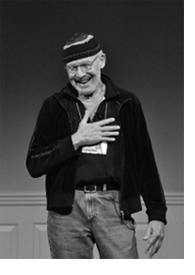Everything Matters: Poetry and the Police Department

It has been bandied about and argued that poetry—or any art for that matter—changes nothing. But everything changes everything, including the least utterance, whether or not we track its significance. Among other many-splendored things—dance, music, painting—poetry is heightened conversation. If it were true that poetry changes nothing, we might as well stop talking to each other; stop communicating altogether.
I had a surprising conversation with an ultrasound technician recently while she searched my body with a machine called a transducer. My doctor had been alarmed I might have a blood clot lodged somewhere along my body’s streets and avenues, and she was scanning my abdomen and legs with sound to find such a clot—if it were there. The transducer, she explained, changes one form of energy into another. In this case, electricity into sound.
While running the head of this sound machine up and down along the insides of my thighs, we fell into a conversation about poetry. I don’t have to tell how we got from transducers, clots, and my naked thighs to poetry, but it’s no longer a surprise to me—as it may be to you—that there are not only fans but lovers of poetry everywhere, from supermarket cashiers to hospital technicians. I’ve been handing out copies of my poems on small cards at such public places for decades. “Oh! You’re giving me a poem,” in tones of surprise and pleasure, is the response I receive. A supermarket bagger stopped me on my way out one day, took a worn copy of a poem I’d given her weeks before out of her pocket and said, “See, I’ve been carrying it around with me.”
It wasn’t long into my conversation with the ultrasound technician before I was reciting poems aloud. She insisted my declaiming did not distract her as she buzzed me over with the transducer. Nearing the end of a poem she stopped, and after I finished she said, “That gave me chills.”
So poetry’s a transducer, I couldn’t help thinking.
All conversation has importance. Text messaging or a spoken conversation on the mobile phone may not be poetry, of course. The Greeks believed memory was the mother of all nine daughters of creativity: by that, they didn’t simply mean memorization but, as the poet David Whyte has observed, the deeper memory of what it means to be fully human, fully alive in this resplendent world, whether in the most banal or stressful circumstances. And hasn’t poetry always been one of the great disciplines of remembering? Thinking about it this way, “poetry becomes a form of rescue,” Whyte says, “that as we write it, or speak it, we are actually bringing this enormous energy back to the surface again, back into conversation with the world.”
A recent happening here in Portland, Maine, is proof that poetry not only changes us but can change even as formal, conservative, and bureaucratic an institution as the police department. Just over a year ago, I participated in Portland’s first Police and Poetry Project, which paired five officers with five poets in mutually mentoring roles.
“I do hate the hat,” the officer I worked with said in one of our conversations, which confidence grew into the following haiku, its spare three lines later succeeding in moving the city’s police chief to change department dress regulations. “The decision to let officers not wear hats in public,” the chief told the state’s largest daily newspaper, “was influenced by a poem.”
I Do Hate the Hat
by Officer Alissa Poisson
Talking to a child
or a victim, someone harmed,
I take it off.
More profoundly, poetry has been a life-saving balm for some in extremely stressful circumstances. Jacques Lusseyran, a Frenchman who survived the Buchenwald concentration camp, says he learned “that poetry is an act, an incantation, a kiss of peace, a medicine…neither more nor less.” In his memoir he talks about how reciting poems lifted the spirits of prisoners. In one of them, he recalls a boy who had lost all hope: “This night I held his arm very firmly, because he was on the verge of collapse. I recited some verses to him. Little by little, as the hours went by, I felt him grow stronger, his closed hands opened. I heard him begin to breathe.”
